MultiFTPServer Library Tutorial for ESP32, Raspberry Pi Pico, Arduino, rp2040, esp8266 and STM32
Finally, we can say hello to MultiFTPServer, a lean, drop-in successor to SimpleFTPServer that finally brings true multi-session FTP to the hobby boards and industrial MCUs you love. With a single, unified API, you can now stream files to and from ESP8266, ESP32, STM32, classic Arduino boards, and the Raspberry Pi Pico W, all at the same time, all from the same sketch or firmware. Under the hood, the library adds an event-driven connection manager, smarter memory handling, and authentication hooks, so your data stays fast and safe even on devices with kilobytes to spare. In the pages ahead, we’ll unpack what changed, why parallel connections matter in real-world IoT workflows, and how to get MultiFTPServer running in minutes on your next project.
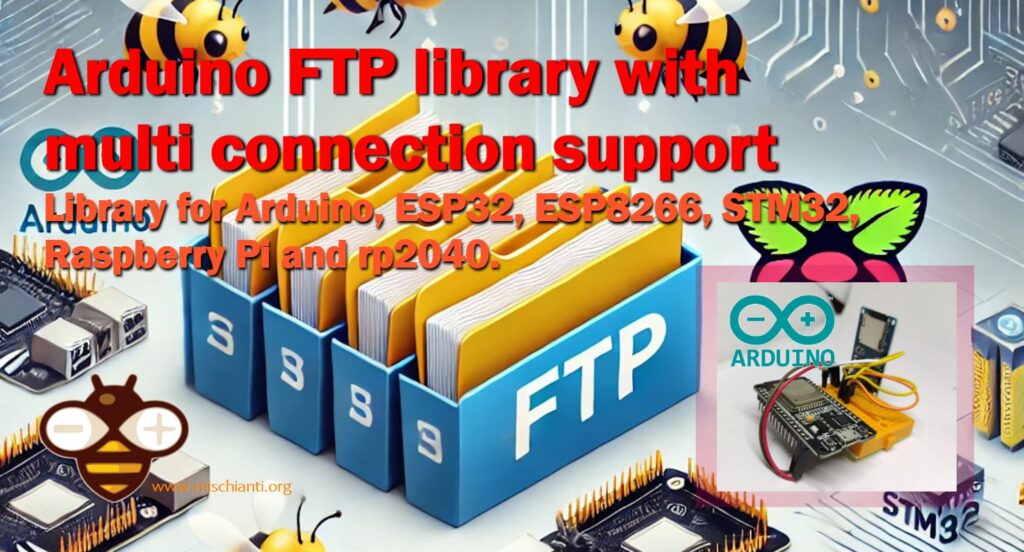
Features
- Multiple concurrent FTP sessions (Set to 2 by default; before setting a superior number of sessions, check the library and microcontroller specification).
- There is support for various storage backends, including SD, SPIFFS, LittleFS, FFat, Seeed SD, SdFat, and more.
- Compatibility with multiple network interfaces: WiFi, Ethernet, and ENC28J60.
- Customizable buffer sizes for optimized performance.
- UTF-8 support for filenames.
- Easy-to-use callbacks for operations and transfers.
- Extensive debug support.
Why MultiFTPServer?
The new MultiFTPServer library addresses the limitations of SimpleFTPServer by allowing multiple simultaneous connections while maintaining a similar configuration structure. This makes it an ideal choice for applications requiring efficient file management over networks.
Library Availability
The MultiFTPServer library is available in the Arduino Library Manager. Search for “MultiFTPServer” and install it directly into your IDE.
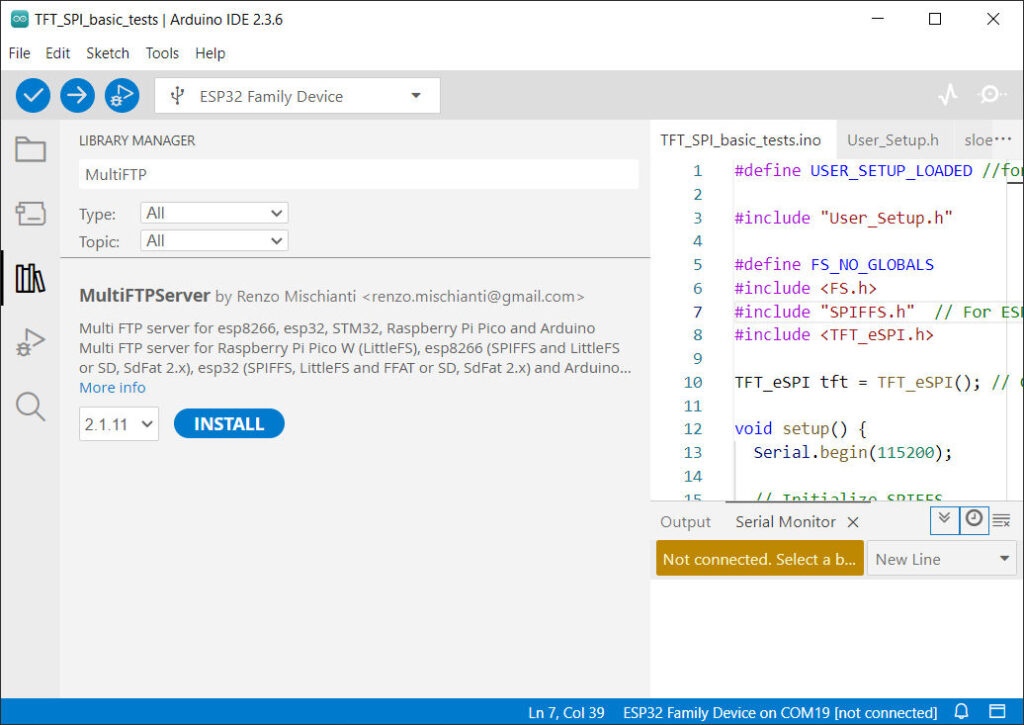
You can also download the source code from GitHub:
For low-power MCUs that can’t handle multiple sessions, or if you simply don’t need concurrent sessions—stick with the reliable, time-tested SimpleFTPServer.
Configuration Options
MultiFTPServer supports various storage types and network configurations. Modify the FtpServerKey.h file to tailor the library to your project. Here are some options:
/********************************************************************************
* FtpServer for:
* - Arduino
* - Arduino SAMD (WiFiNINA)
* - esp8266
* - esp32
* - STM32
* - Raspberry Pi Pico W
*
* Derived form Jean-Michel Gallego version
* AUTHOR: Renzo Mischianti
*
* https://www.mischianti.org/category/my-libraries/simple-ftp-server/
*
********************************************************************************/
/*******************************************************************************
** **
** SETTINGS FOR FTP SERVER **
** **
*******************************************************************************/
#ifndef FTP_SERVER_CONFIG_H
#define FTP_SERVER_CONFIG_H
// Uncomment to enable printing out nice debug messages.
// #define FTP_SERVER_DEBUG
// #define FTP_ADDITIONAL_DEBUG
// Define where debug output will be printed.
#define DEBUG_PRINTER Serial
#define STORAGE_SDFAT1 1 // Library SdFat version 1.4.x
#define STORAGE_SDFAT2 2 // Library SdFat version >= 2.0.2
#define STORAGE_SPIFM 3 // Libraries Adafruit_SPIFlash and SdFat-Adafruit-Fork
#define STORAGE_FATFS 4 // Library FatFs
#define STORAGE_SD 5 // Standard SD library (suitable for Arduino esp8266 and esp32
#define STORAGE_SPIFFS 6 // SPIFFS
#define STORAGE_LITTLEFS 7 // LITTLEFS
#define STORAGE_SEEED_SD 8 // Seeed_SD library
#define STORAGE_FFAT 9 // ESP32 FFAT
#define STORAGE_SD_MMC 10 // SD_MMC library
#define NETWORK_ESP8266_ASYNC (1)
#define NETWORK_ESP8266 (2) // Standard ESP8266WiFi
#define NETWORK_ESP8266_242 (3) // ESP8266WiFi before 2.4.2 core
#define NETWORK_W5100 (4) // Standard Arduino Ethernet library
#define NETWORK_ETHERNET (4) // Standard Arduino Ethernet library
#define NETWORK_ENC28J60 (5) // UIPEthernet library
#define NETWORK_ESP32 (6) // Standard WiFi library
#define NETWORK_RP2040_WIFI (15) // Raspberry Pi Pico W standard WiFi library
#define NETWORK_ESP32_ETH (7) // Standard ETH library
#define NETWORK_WiFiNINA (8) // Standard WiFiNINA library
#define NETWORK_SEEED_RTL8720DN (9) // Standard SEED WiFi library
#define NETWORK_ETHERNET_LARGE (10)
#define NETWORK_ETHERNET_ENC (11) // EthernetENC library (evolution of UIPEthernet
#define NETWORK_ETHERNET_STM (12)
#define NETWORK_UIPETHERNET (13) // UIPEthernet library same of NETWORK_ENC28J60
#define NETWORK_ETHERNET_GENERIC (14) // Ethernet generic
// esp8266 configuration
#ifndef DEFAULT_FTP_SERVER_NETWORK_TYPE_ESP8266
#define DEFAULT_FTP_SERVER_NETWORK_TYPE_ESP8266 NETWORK_ESP8266
#define DEFAULT_STORAGE_TYPE_ESP8266 STORAGE_LITTLEFS
#endif
// esp32 configuration
#ifndef DEFAULT_FTP_SERVER_NETWORK_TYPE_ESP32
#define DEFAULT_FTP_SERVER_NETWORK_TYPE_ESP32 NETWORK_ESP32
#define DEFAULT_STORAGE_TYPE_ESP32 STORAGE_FFAT
/**
To use Ethernet.h with esp32 fix would be to change in Ethernet.h the line
class EthernetServer : public Server {
to
class EthernetServer : public Stream {
or
in \esp32\2.0.6\cores\esp32\Server.h
A workaround is to change line 28 of the ESP32 core's Server.h from:
virtual void begin(uint16_t port=0) =0;
to
virtual void begin() =0;
However, the last one, that will break anything that uses the ESP32 WiFi library's WebServer class.
https://github.com/arduino-libraries/Ethernet/issues/193
https://github.com/arduino-libraries/Ethernet/issues/88
*
*/
#endif
// Standard AVR Arduino configuration
#ifndef DEFAULT_FTP_SERVER_NETWORK_TYPE_ARDUINO
#define DEFAULT_FTP_SERVER_NETWORK_TYPE_ARDUINO NETWORK_W5100
#define DEFAULT_STORAGE_TYPE_ARDUINO STORAGE_SD
#endif
// STM32 configuration
#ifndef DEFAULT_FTP_SERVER_NETWORK_TYPE_STM32
#define DEFAULT_FTP_SERVER_NETWORK_TYPE_STM32 NETWORK_W5100
#define DEFAULT_STORAGE_TYPE_STM32 STORAGE_SDFAT2
#endif
// Raspberry Pi Pico (rp2040) configuration
#ifndef DEFAULT_FTP_SERVER_NETWORK_TYPE_RP2040
#define DEFAULT_FTP_SERVER_NETWORK_TYPE_RP2040 NETWORK_RP2040_WIFI
#define DEFAULT_STORAGE_TYPE_RP2040 STORAGE_LITTLEFS
#endif
// Arduino SAMD21 like Arduino MKR Nano 33 IoT or Wio Terminal
#ifndef DEFAULT_FTP_SERVER_NETWORK_TYPE_ARDUINO_SAMD
// Wio Terminal
// #define DEFAULT_FTP_SERVER_NETWORK_TYPE_SAMD NETWORK_SEEED_RTL8720DN
// #define DEFAULT_STORAGE_TYPE_SAMD STORAGE_SEEED_SD
// Arduino SAMD
#define DEFAULT_FTP_SERVER_NETWORK_TYPE_SAMD NETWORK_WiFiNINA
#define DEFAULT_STORAGE_TYPE_SAMD STORAGE_SD
#endif
#define UTF8_SUPPORT
//#define SD_CS_PIN 4
// Disconnect client after 5 minutes of inactivity (expressed in seconds)
#ifndef FTP_TIME_OUT
#define FTP_TIME_OUT 5 * 60
#endif
// Wait for authentication for 10 seconds (expressed in seconds)
#ifndef FTP_AUTH_TIME_OUT
#define FTP_AUTH_TIME_OUT 10
#endif
// Size of file buffer for read/write
// Transfer speed depends of this value
// Best value depends on many factors: SD card, client side OS, ...
// But it can be reduced to 512 if memory usage is critical.
#ifndef FTP_BUF_SIZE
#define FTP_BUF_SIZE 1024 //2048 //1024 // 512
#endif
// Define the maximum number of concurrent sessions
#ifndef FTP_MAX_SESSIONS
#define FTP_MAX_SESSIONS 2
#endif
#endif // FTP_SERVER_CONFIG_H
Adjust these definitions to match your hardware setup.
For example the ESP32 section
#ifndef DEFAULT_FTP_SERVER_NETWORK_TYPE_ESP32
#define DEFAULT_FTP_SERVER_NETWORK_TYPE_ESP32 NETWORK_ESP32
#define DEFAULT_STORAGE_TYPE_ESP32 STORAGE_FFAT
#endif
Allow to define the network by changing the value by changing the value of this line.
#define DEFAULT_FTP_SERVER_NETWORK_TYPE_ESP32 NETWORK_ESP32
There are a large set of values, but only some are allowed for a specified microcontroller family.
#define NETWORK_ESP8266_ASYNC (1)
#define NETWORK_ESP8266 (2) // Standard ESP8266WiFi
#define NETWORK_ESP8266_242 (3) // ESP8266WiFi before 2.4.2 core
#define NETWORK_W5100 (4) // Standard Arduino Ethernet library
#define NETWORK_ETHERNET (4) // Standard Arduino Ethernet library
#define NETWORK_ENC28J60 (5) // UIPEthernet library
#define NETWORK_ESP32 (6) // Standard WiFi library
#define NETWORK_RP2040_WIFI (15) // Raspberry Pi Pico W standard WiFi library
#define NETWORK_ESP32_ETH (7) // Standard ETH library
#define NETWORK_WiFiNINA (8) // Standard WiFiNINA library
#define NETWORK_SEEED_RTL8720DN (9) // Standard SEED WiFi library
#define NETWORK_ETHERNET_LARGE (10)
#define NETWORK_ETHERNET_ENC (11) // EthernetENC library (evolution of UIPEthernet
#define NETWORK_ETHERNET_STM (12)
#define NETWORK_UIPETHERNET (13) // UIPEthernet library same of NETWORK_ENC28J60
#define NETWORK_ETHERNET_GENERIC (14) // Ethernet generic
Samething for the reference filesystem.
#define DEFAULT_STORAGE_TYPE_ESP32 STORAGE_FFAT
By default the value is FFAT, but you can chose from this list some other values.
#define STORAGE_SDFAT1 1 // Library SdFat version 1.4.x
#define STORAGE_SDFAT2 2 // Library SdFat version >= 2.0.2
#define STORAGE_SPIFM 3 // Libraries Adafruit_SPIFlash and SdFat-Adafruit-Fork
#define STORAGE_FATFS 4 // Library FatFs
#define STORAGE_SD 5 // Standard SD library (suitable for Arduino esp8266 and esp32
#define STORAGE_SPIFFS 6 // SPIFFS
#define STORAGE_LITTLEFS 7 // LITTLEFS
#define STORAGE_SEEED_SD 8 // Seeed_SD library
#define STORAGE_FFAT 9 // ESP32 FFAT
#define STORAGE_SD_MMC 10 // SD_MMC library
The most used alternatives for ESP32 are LittleFS, SPIFFS (standard for the old core), and naturally SD.
Features in Detail
Multi-Session Support
To enable multiple sessions, configure the FTP_MAX_SESSIONS parameter in the configuration:
#define FTP_MAX_SESSIONS 2
This allows two concurrent FTP sessions.
Debugging
Enable debugging to print detailed logs:
#define FTP_SERVER_DEBUG
#define FTP_ADDITIONAL_DEBUG
Debug messages are printed to Serial. You can change the debug output by redefining DEBUG_PRINTER:
#define DEBUG_PRINTER Serial
Buffer Size
The buffer size determines transfer speed and memory usage. Configure it in the configuration file:
#define FTP_BUF_SIZE 1024
Authentication Timeout
Set the timeout for user authentication:
#define FTP_AUTH_TIME_OUT 10
Session Timeout
Set the timeout for inactive sessions:
#define FTP_TIME_OUT 300
UTF-8 Filename Support
UTF-8 filenames are supported by default. Ensure UTF8_SUPPORT is defined in the configuration file.
#define UTF8_SUPPORT
Examples
The default configuration for ESP32 uses the FFat filesystem, and here is an example of an FTP server.
/*
* Simple FTP Server Example with FFat on ESP32
*
* AUTHOR: Renzo Mischianti
* URL: https://www.mischianti.org
*
* DESCRIPTION:
* This example demonstrates the use of the MultiFTPServer library
* with the FFat file system on an ESP32. The sketch connects to a WiFi network,
* initializes the FFat file system, and sets up an FTP server for file management.
*/
#include <Arduino.h>
#include <FS.h>
#include <FFat.h>
#include <WiFi.h>
#include <MultiFTPServer.h>
// WiFi credentials
const char* WIFI_SSID = "reef-casa-sopra"; // Replace with your WiFi SSID
const char* WIFI_PASSWORD = "aabbccdd77"; // Replace with your WiFi password
// FTP server instance
FtpServer ftpServer;
void setup() {
// Initialize Serial Monitor
Serial.begin(115200);
Serial.println("Initializing...");
// Connect to WiFi network
Serial.printf("Connecting to WiFi: %s\n", WIFI_SSID);
WiFi.begin(WIFI_SSID, WIFI_PASSWORD);
// Wait for WiFi connection
while (WiFi.status() != WL_CONNECTED) {
delay(500);
Serial.print(".");
}
Serial.println("\nWiFi connected!");
Serial.printf("Connected to: %s\n", WIFI_SSID);
Serial.printf("IP Address: %s\n", WiFi.localIP().toString().c_str());
// Initialize FFat file system
Serial.println("Initializing FFat file system...");
if (FFat.begin(true)) { // Auto-format FFat if not already formatted
Serial.println("FFat initialized successfully!");
Serial.println("Formatting FFat...");
FFat.format(); // Optional: Format FFat (use only if needed)
} else {
Serial.println("Failed to initialize FFat!");
return; // Stop further execution if FFat initialization fails
}
// Start FTP server
ftpServer.begin("user", "password"); // Set FTP username and password
Serial.println("FTP server started!");
Serial.println("You can now access the FFat file system via FTP.");
}
void loop() {
// Handle FTP server requests
ftpServer.handleFTP(); // Continuously process FTP requests
}
FTP Server on ESP32 and SD card
Here is a little sketch to manage the SD card FTP Server with ESP32
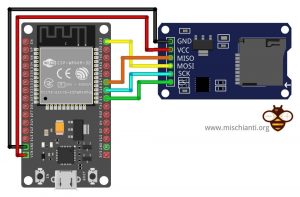
To put on work you must change configuration like so.
#ifndef DEFAULT_FTP_SERVER_NETWORK_TYPE_ESP32
#define DEFAULT_FTP_SERVER_NETWORK_TYPE_ESP32 NETWORK_ESP32
#define DEFAULT_STORAGE_TYPE_ESP32 STORAGE_SD
#endif
And here the code.
/*
* Simple FTP Server Example with SD Card on ESP32
*
* AUTHOR: Renzo Mischianti
* URL: https://www.mischianti.org
*
* DESCRIPTION:
* This example demonstrates how to use the MultiFTPServer library
* with an ESP32 and an SD card module. The ESP32 connects to a WiFi network
* and initializes an FTP server for file transfers.
*
* FEATURES:
* - WiFi connection to local network
* - SD card initialization for file storage
* - FTP server setup for file uploads and downloads
*/
#include <WiFi.h>
#include <MultiFTPServer.h>
#include <SPI.h>
#include <SD.h>
// WiFi credentials
const char* WIFI_SSID = "<YOUR-SSID>"; // Replace with your WiFi SSID
const char* WIFI_PASSWORD = "<YOUR-PASSWD>"; // Replace with your WiFi password
// SD card chip select pin
const int CHIP_SELECT_PIN = SS; // Default SS pin for SPI
// FTP server instance
FtpServer ftpServer;
void setup() {
// Initialize Serial Monitor
Serial.begin(9600);
while (!Serial) {
// Wait for serial port to connect (required for native USB ports)
}
// Connect to WiFi network
Serial.println("Connecting to WiFi...");
WiFi.begin(WIFI_SSID, WIFI_PASSWORD);
while (WiFi.status() != WL_CONNECTED) {
delay(500);
Serial.print(".");
}
Serial.println("\nWiFi connected!");
Serial.printf("Connected to: %s\n", WIFI_SSID);
Serial.printf("IP Address: %s\n", WiFi.localIP().toString().c_str());
// Wait for a short delay before initializing SD card
delay(1000);
// Initialize SD card
Serial.print("Initializing SD card...");
while (!SD.begin(CHIP_SELECT_PIN)) {
delay(500);
Serial.print(".");
}
Serial.println("\nSD card initialized successfully!");
// Start FTP server with username and password
ftpServer.begin("user", "password"); // Replace with your desired FTP credentials
Serial.println("FTP server started!");
}
void loop() {
// Handle FTP server operations
ftpServer.handleFTP(); // Continuously process FTP requests
}
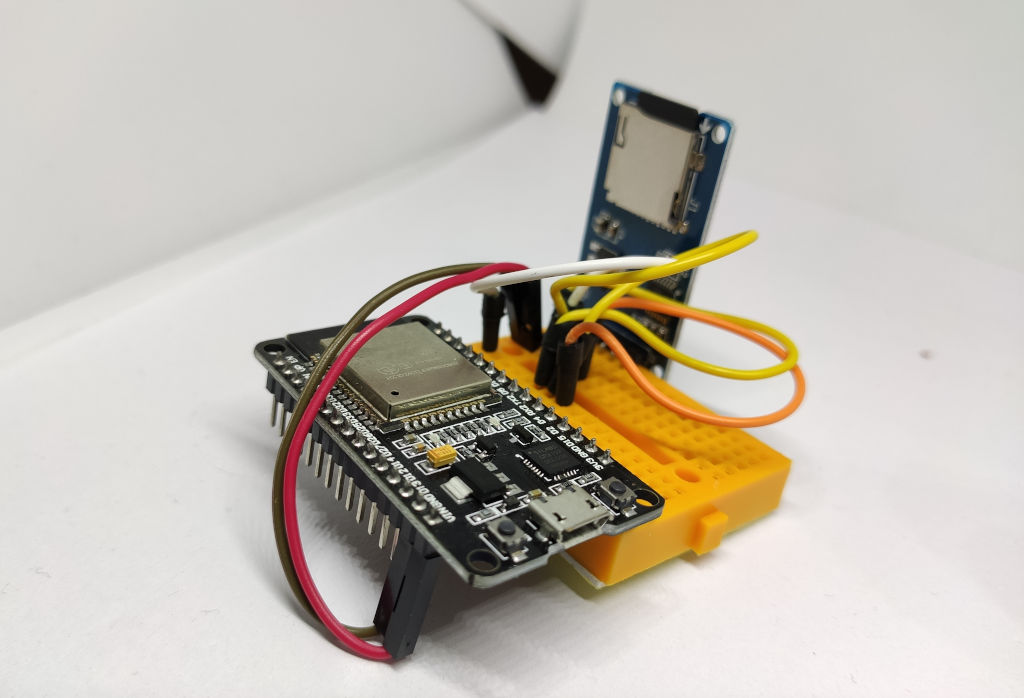
Add a status callback to your FTP Server
The library offer the opportunity to add some callback to check the state of connection or transfer.
The signs of the functions are:
void (*_callback)(FtpOperation ftpOperation, unsigned int freeSpace, unsigned int totalSpace){};
void (*_transferCallback)(FtpTransferOperation ftpOperation, const char* name, unsigned int transferredSize){};
Main callback
The first is called when one of these operation is executed:
FTP_CONNECT: a connection is established;FTP_DISCONNECT: client is disconnected;FTP_FREE_SPACE_CHANGE: free space is changed.
The other parameters are:
freeSpace: space available on SD;totalSpace: total space of SD.
Transfer callback
The second one when these operation are executed:
FTP_UPLOAD_START: when an upload is started;FTP_UPLOAD: when an upload is in course;FTP_DOWNLOAD_START: when download is started;FTP_DOWNLOAD: when a download is in course;FTP_DOWNLOAD_STOPorFTP_TRANSFER_STOP: when download is finished;FTP_UPLOAD_STOPorFTP_TRANSFER_STOP: when upload is finished;FTP_DOWNLOAD_ERRORorFTP_TRANSFER_ERROR: when a download error is occured;FTP_UPLOAD_ERRORorFTP_TRANSFER_ERROR: when an upload error is occured.
The other parameters are:
name: the name of the file;transferredSize: the size transferred.
Example sketch with callback
The resulting code with callbacks can be:
/*
* FtpServer with ESP32 and FFat File System
*
* AUTHOR: Renzo Mischianti
*
* This code sets up an FTP server on an ESP32 using the FFat file system.
* The server provides basic FTP functionalities, such as uploading and downloading files,
* with callback functions to monitor connection and transfer events.
*
* For detailed information, visit:
* https://www.mischianti.org/2020/02/08/ftp-server-on-esp8266-and-esp32
*/
#include "FS.h"
#include "FFat.h"
#include <WiFi.h>
#include <MultiFTPServer.h>
// WiFi credentials
const char* ssid = "reef-casa-sopra";
const char* password = "aabbccdd77";
// FTP server instance
FtpServer ftpSrv;
/**
* Callback function for FTP operations.
* Provides status updates for FTP connection events.
*/
void ftpOperationCallback(FtpOperation ftpOperation, unsigned int freeSpace, unsigned int totalSpace) {
switch (ftpOperation) {
case FTP_CONNECT:
Serial.println(F("FTP: Client connected!"));
break;
case FTP_DISCONNECT:
Serial.println(F("FTP: Client disconnected!"));
break;
case FTP_FREE_SPACE_CHANGE:
Serial.printf("FTP: Free space changed. Free: %u bytes, Total: %u bytes.\n", freeSpace, totalSpace);
break;
default:
break;
}
}
/**
* Callback function for FTP transfers.
* Provides status updates for file upload and download events.
*/
void ftpTransferCallback(FtpTransferOperation ftpOperation, const char* fileName, unsigned int transferredSize) {
switch (ftpOperation) {
case FTP_UPLOAD_START:
Serial.printf("FTP: Started uploading file: %s\n", fileName);
break;
case FTP_UPLOAD:
Serial.printf("FTP: Uploading file: %s, Transferred: %u bytes\n", fileName, transferredSize);
break;
case FTP_DOWNLOAD_START:
Serial.printf("FTP: Started downloading file: %s\n", fileName);
break;
case FTP_DOWNLOAD:
Serial.printf("FTP: Downloading file: %s, Transferred: %u bytes\n", fileName, transferredSize);
break;
case FTP_TRANSFER_STOP:
Serial.println(F("FTP: Transfer completed successfully."));
break;
case FTP_TRANSFER_ERROR:
Serial.println(F("FTP: Error during file transfer!"));
break;
default:
break;
}
}
void setup() {
// Initialize serial communication
Serial.begin(115200);
// Connect to WiFi
Serial.println(F("Connecting to WiFi..."));
WiFi.begin(ssid, password);
while (WiFi.status() != WL_CONNECTED) {
delay(500);
Serial.print(".");
}
Serial.println("\nWiFi connected!");
Serial.print(F("IP Address: "));
Serial.println(WiFi.localIP());
// Initialize FFat file system
Serial.print(F("Initializing FFat filesystem..."));
if (FFat.begin(true)) {
Serial.println(F("done."));
} else {
Serial.println(F("failed! Please check FFat setup."));
while (true) { delay(1000); }
}
// Set FTP server callbacks
ftpSrv.setCallback(ftpOperationCallback);
ftpSrv.setTransferCallback(ftpTransferCallback);
// Start FTP server with username and password
Serial.println(F("Starting FTP server..."));
ftpSrv.begin("user", "password"); // Username: "user", Password: "password"
}
void loop() {
// Handle FTP server operations
ftpSrv.handleFTP();
}
Here the serial output of upload a file and delete 2 files:
Connecting to WiFi...
.....
WiFi connected!
IP Address: 192.168.1.57
Initializing FFat filesystem...done.
Starting FTP server...
FTP: Client connected!
FTP: Started uploading file: api-82.jar
FTP: Uploading file: api-82.jar, Transferred: 1024 bytes
FTP: Uploading file: api-82.jar, Transferred: 2048 bytes
FTP: Uploading file: api-82.jar, Transferred: 3072 bytes
FTP: Uploading file: api-82.jar, Transferred: 4096 bytes
FTP: Uploading file: api-82.jar, Transferred: 5120 bytes
FTP: Uploading file: api-82.jar, Transferred: 6144 bytes
FTP: Uploading file: api-82.jar, Transferred: 7168 bytes
FTP: Uploading file: api-82.jar, Transferred: 8192 bytes
FTP: Uploading file: api-82.jar, Transferred: 9216 bytes
FTP: Uploading file: api-82.jar, Transferred: 10240 bytes
FTP: Uploading file: api-82.jar, Transferred: 11264 bytes
FTP: Uploading file: api-82.jar, Transferred: 12288 bytes
FTP: Uploading file: api-82.jar, Transferred: 13312 bytes
FTP: Uploading file: api-82.jar, Transferred: 14336 bytes
FTP: Uploading file: api-82.jar, Transferred: 15360 bytes
FTP: Uploading file: api-82.jar, Transferred: 16384 bytes
FTP: Uploading file: api-82.jar, Transferred: 17408 bytes
FTP: Uploading file: api-82.jar, Transferred: 18432 bytes
FTP: Uploading file: api-82.jar, Transferred: 19456 bytes
FTP: Uploading file: api-82.jar, Transferred: 20480 bytes
FTP: Uploading file: api-82.jar, Transferred: 21504 bytes
FTP: Uploading file: api-82.jar, Transferred: 22528 bytes
FTP: Uploading file: api-82.jar, Transferred: 23552 bytes
FTP: Uploading file: api-82.jar, Transferred: 24576 bytes
FTP: Uploading file: api-82.jar, Transferred: 25478 bytes
FTP: Transfer completed successfully.
FTP: Free space changed. Free: 1261568 bytes, Total: 10240000 bytes.
FTP: Free space changed. Free: 3510272 bytes, Total: 10240000 bytes.
FTP: Free space changed. Free: 10211328 bytes, Total: 10240000 bytes.
We are going to analize the output:
- line 7: identify the connection of the client;
- from 8 to 35: at line 8, start upload transfer from 8 to 33, transfer in the course at line 34, finish transfer;
- line 37 and 38: free space changed by delete file;
Supported Platforms
The MultiFTPServer library supports the following platforms:
| Platform | Network Type | Default Storage |
|---|---|---|
| ESP8266 | WiFi, Ethernet | SPIFFS, SPIflash, LittleFS and SD |
| ESP32 | WiFi, Ethernet | SPIFFS, SPI Flash, LittleFS, FFat and SD |
| Arduino | Ethernet, WiFiNINA, WiFi, External WiFi | SD, SPI Flash, SdFat1 and SdFat2 |
| STM32 | Ethernet, External WiFi | SPI Flash, SdFat2 |
| Raspberry Pi Pico | Ethernet, WiFi (RP2040) and External WiFi | LittleFS, SPI Flash, SdFat2 and SD |
Configure client
When you configure your client, pay attention to the “Maximun number of connections:” that must be the same as the number specified in the library.
I use FileZilla as client, you can download It here, It quite simple to use and configure.
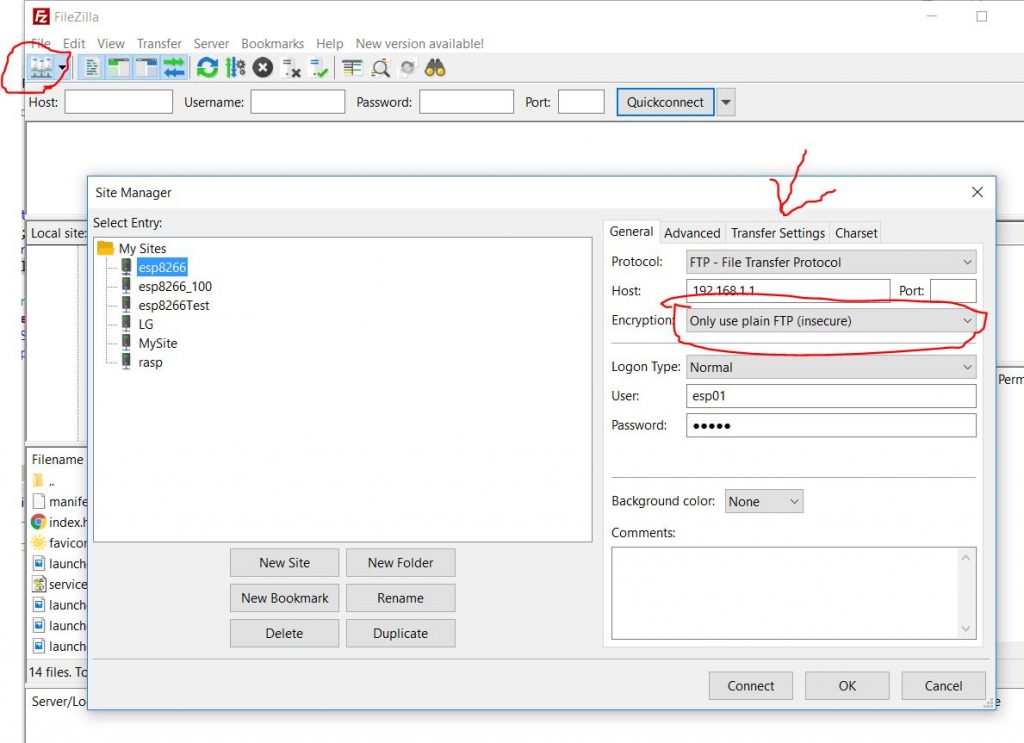
First you must go on Manage site --> New site and now set this parameter:
- Select
FTPas protocol; - Select
Use plain FTP (insecure); - Set you login and password (you choice that in sketch);
- Than on
Trasfer settingsselectMaximun number of connectionequal 1; - Now connect to your device.
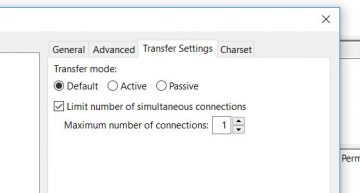
If you want to transfer big file, you must extend timeout time.
Thanks
- SimpleFTPServer library: esp32 and esp8266 how to
- SimpleFTPServer library: WioTerminal how to
- FTP server on STM32 with w5500, enc28j60, SD Card, and SPI Flash
- MultiFTPServer Library Tutorial for ESP32, Raspberry Pi Pico, Arduino, rp2040, esp8266 and STM32







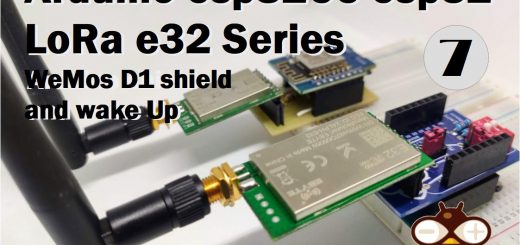



Thanks for the libray!
To keep all into my sketch folder I’ve directly included the lib files into in my sketch folder, below the files:
– FtpServer.cpp
– FtpServer.h
– FtpServerKey.h
– MultiFTPServer.h
– SimpleFTPServer.h
Into the FtpServerKey.h file I’ve deleted all configs and leave only the one related the ESP32.
Also I’ve included into my sketch file the:
#include “MultiFTPServer.h”
But the compilation stage exit with an error into the libray as below reported:
In file included from C:\Tecnico\Arduino\ESP32\inclinm\FtpServer.cpp:49:
FtpServer.h:742:15: error: ISO C++ forbids in-class initialization of non-const static member ‘FtpServer::anonymousConnection’
742 | static bool anonymousConnection = false;
| ^~~~~~~~~~~~~~~~~~~
In file included from C:\myfolder\Arduino\ESP32\mysketch\MultiFTPServer.h:15,
from C:\myfolder\Arduino\ESP32\mysketch\mysketch.ino:30:
FtpServer.h:742:15: error: ISO C++ forbids in-class initialization of non-const static member ‘FtpServer::anonymousConnection’
742 | static bool anonymousConnection = false;
| ^~~~~~~~~~~~~~~~~~~
ISO C++ forbids in-class initialization of non-const static member ‘FtpServer::anonymousConnection’
do you have some idea how to solve?
Thanks and best regards.
Hi Fire,
Please don’t remove the code. The code inside #define is excluded during compilation, so just specify the configuration.
Bye,
Renzo
Hi
I managed to run the simple FTP server, then I tried with the MultiFTPServer: I installed the library using the Arduino 2 interface and tried to compile the ESP32 examples without changing anything but I get the error:
In file included from c:\Users\….\Arduino\libraries\MultiFTPServer/MultiFTPServer.h:15,
from C:\Users\….\AppData\Local\Temp\.arduinoIDE-unsaved2025917-33160-1c1pu8h.wxaz\ESP32_AP_FFAT_WiFi\ESP32_AP_FFAT_WiFi.ino:14:
c:\Users\…\Arduino\libraries\MultiFTPServer/FtpServer.h:742:15: error: ISO C++ forbids in-class initialization of non-const static member ‘FtpServer::anonymousConnection’
742 | static bool anonymousConnection = false;
| ^~~~~~~~~~~~~~~~~~~
exit status 1
Compilation error: exit status 1
Hi Dario,
I fixed it in this branch, I also add a lot of enhancements try it.
Bye Renzo
Hi Renzo.
Now I can compile and the FTP server works but the “case FTP_FREE_SPACE_CHANGE:” inside the _callback procedure is never executed.
In version 2.1.11 I managed to compile changing the FtpServer.h: line 742 from “static bool anonymousConnection = false;” to “static bool anonymousConnection;”. With the 2.1.11 version the calback procedure worked.
Hi,
Try now, I fix the pointer to the function.
Give me a feedback please!
It works now! Thank you.
In the callback function there is also an other bug regarding the size of the filesystem. The original example show weird numbers (even in the older versions). I have added a couple of lines to my code to show the correct numbers: here is the piece of code
case FTP_FREE_SPACE_CHANGE:
Serial.printf(“>>>>>>>>>>FTP: Free space change, free %u of %u!\n”, freeSpace, totalSpace);
//rows added by me: Serial.print(“Total space: “);
Serial.print(LittleFS.totalBytes());
Serial.println(” bytes”);
Serial.print(“Total space used: “);
Serial.print(LittleFS.usedBytes());
Serial.println(” bytes”);
Serial.print(“Total space free: “);
Serial.print(LittleFS.totalBytes()-LittleFS.usedBytes());
Serial.println(” bytes”);
for example this is the output that i get after transferring a file:
13:26:39.963 -> >>>>>>>>>>FTP: Free space change, free 137216 of 720896!
13:26:39.963 -> Total space: 1441792 bytes
13:26:39.963 -> Total space used: 1167360 bytes
13:26:39.963 -> Total space free: 274432 bytes
The correct values are Total space 1441792 and used space 1167360. while the original example rows show wrong values (137216 of 720896).
It works, thank you
after a couple of months I am trying to recompile the multu FTP examples but now I get the following error:
C:\Users\...\Arduino\LITTLEFS and FTP\LITTLEFS_time_MultiFTP\LITTLEFS_time_MultiFTP.ino:249:22: error: invalid conversion from 'void (*)(FtpOperation, unsigned int, unsigned int)' to 'void (*)(FtpOperation, uint32_t, uint32_t)' {aka 'void (*)(FtpOperation, long unsigned int, long unsigned int)'} [-fpermissive] 249 | ftpSrv.setCallback(_callback); | ^~~~~~~~~ | | | void (*)(FtpOperation, unsigned int, unsigned int) In file included from c:\Users\...\Arduino\libraries\MultiFTPServer/MultiFTPServer.h:15, from C:\Users\...\Arduino\LITTLEFS and FTP\LITTLEFS_time_MultiFTP\LITTLEFS_time_MultiFTP.ino:7: c:\Users\...\Arduino\libraries\MultiFTPServer/FtpServer.h:563:33: note: initializing argument 1 of 'void FtpServer::setCallback(void (*)(FtpOperation, uint32_t, uint32_t))' 563 | void setCallback(void (*_callbackParam)(FtpOperation ftpOperation, uint32_t freeSpace, uint32_t totalSpace) ) | ~~~~~~~^~~~~~~~~~~~~~~~~~~~~~~~~~~~~~~~~~~~~~~~~~~~~~~~~~~~~~~~~~~~~~~~~~~~~~~~~~~~~~~~~~~ C:\Users\...\Arduino\LITTLEFS and FTP\LITTLEFS_time_MultiFTP\LITTLEFS_time_MultiFTP.ino:250:30: error: invalid conversion from 'void (*)(FtpTransferOperation, const char*, unsigned int)' to 'void (*)(FtpTransferOperation, const char*, uint32_t)' {aka 'void (*)(FtpTransferOperation, const char*, long unsigned int)'} [-fpermissive] 250 | ftpSrv.setTransferCallback(_transferCallback); | ^~~~~~~~~~~~~~~~~ | | | void (*)(FtpTransferOperation, const char*, unsigned int) c:\Users\...\Arduino\libraries\MultiFTPServer/FtpServer.h:568:41: note: initializing argument 1 of 'void FtpServer::setTransferCallback(void (*)(FtpTransferOperation, const char*, uint32_t))' 568 | void setTransferCallback(void (*_transferCallbackParam)(FtpTransferOperation ftpOperation, const char* name, uint32_t transferredSize) ) | ~~~~~~~^~~~~~~~~~~~~~~~~~~~~~~~~~~~~~~~~~~~~~~~~~~~~~~~~~~~~~~~~~~~~~~~~~~~~~~~~~~~~~~~~~~~~~~~~~~~~~~~~~~~~~ exit status 1 Compilation error: invalid conversion from 'void (*)(FtpOperation, unsigned int, unsigned int)' to 'void (*)(FtpOperation, uint32_t, uint32_t)' {aka 'void (*)(FtpOperation, long unsigned int, long unsigned int)'} [-fpermissive]SOLVED. I had to change the callback definitions in my old program: the correct ones to be used are:
void _callback(FtpOperation ftpOperation, uint32_t freeSpace, uint32_t totalSpace)
and
void _transferCallback(FtpTransferOperation ftpOperation, const char* name, uint32_t transferredSize)
Hi Dario,
Thanks for the feedback, I will double-check the compatibility when I do the refactor.
Thanks again, Renzo